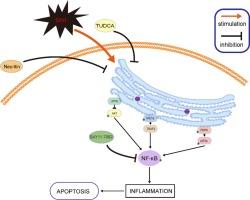Neuritin attenuates neuroinflammation and apoptosis in early brain injury after subarachnoid hemorrhage via endoplasmic reticulum stress-related inflammatory pathways
IF 2.7
4区 医学
Q3 NEUROSCIENCES
引用次数: 0
Abstract
Neuroinflammation is a key destructive pathophysiological process in early brain injury (EBI) following subarachnoid hemorrhage (SAH). Recent studies have discovered that endoplasmic reticulum stress-related inflammatory pathways include the IRE1α-TRAF2-NF-κB pathway, PERK-eIF2α-NF-κB pathway, and ATF6-AKT −NF-κB pathway leading to neuroinflammatory response. Neuritin is a neurotrophin that is involved in neuronal plasticity and regeneration. Studies have suggested that Neuritin has a vital role in reducing neuroinflammation, and can also decrease the expression of proteins related to endoplasmic reticulum stress following SAH. This suggests that Neuritin could be a potential therapeutic target for SAH and other neurological conditions. However, the regulatory mechanisms of Neuritin in ER stress-related inflammatory pathways after SAH are not yet fully understood. In this work, we discovered that the activation of ER stress-related inflammatory pathways leads to neuroinflammation, which further aggravates neuronal apoptosis after SAH. Our findings indicate that Neuritin overexpression play a neuroprotective role by inhibiting IRE1α-TRAF2-NF-κB pathway, PERK-eIF2α-NF-κB pathway, and ATF6-AKT-NF-κB pathway associated with endoplasmic reticulum stress. These inhibitory effects on neuroinflammation ultimately reduce nerve cell apoptosis.

神经营养素通过内质网应激相关炎症途径减轻蛛网膜下腔出血后早期脑损伤中的神经炎症和细胞凋亡。
神经炎症是蛛网膜下腔出血(SAH)后早期脑损伤(EBI)的一个关键破坏性病理生理过程。最新研究发现,内质网应激相关炎症通路包括 IRE1α-TRAF2-NF-κB 通路、PERK-eIF2α-NF-κB 通路和 ATF6-AKT -NF-κB 通路,这些通路导致神经炎症反应。Neuritin 是一种神经营养素,参与神经元的可塑性和再生。研究表明,Neuritin 在减少神经炎症方面发挥着重要作用,还能减少 SAH 后内质网应激相关蛋白的表达。这表明,Neuritin 可能是治疗 SAH 和其他神经疾病的潜在靶点。然而,Neuritin 在 SAH 后与 ER 应激相关的炎症通路中的调控机制尚未完全明了。在这项研究中,我们发现 ER 应激相关炎症通路的激活会导致神经炎症,而神经炎症会进一步加重 SAH 后神经元的凋亡。我们的研究结果表明,Neuritin过表达可抑制与内质网应激相关的IRE1α-TRAF2-NF-κB通路、PERK-eIF2α-NF-κB通路和ATF6-AKT-NF-κB通路,从而发挥神经保护作用。这些对神经炎症的抑制作用最终会减少神经细胞的凋亡。
本文章由计算机程序翻译,如有差异,请以英文原文为准。
求助全文
约1分钟内获得全文
求助全文
来源期刊

Brain Research
医学-神经科学
CiteScore
5.90
自引率
3.40%
发文量
268
审稿时长
47 days
期刊介绍:
An international multidisciplinary journal devoted to fundamental research in the brain sciences.
Brain Research publishes papers reporting interdisciplinary investigations of nervous system structure and function that are of general interest to the international community of neuroscientists. As is evident from the journals name, its scope is broad, ranging from cellular and molecular studies through systems neuroscience, cognition and disease. Invited reviews are also published; suggestions for and inquiries about potential reviews are welcomed.
With the appearance of the final issue of the 2011 subscription, Vol. 67/1-2 (24 June 2011), Brain Research Reviews has ceased publication as a distinct journal separate from Brain Research. Review articles accepted for Brain Research are now published in that journal.
 求助内容:
求助内容: 应助结果提醒方式:
应助结果提醒方式:


